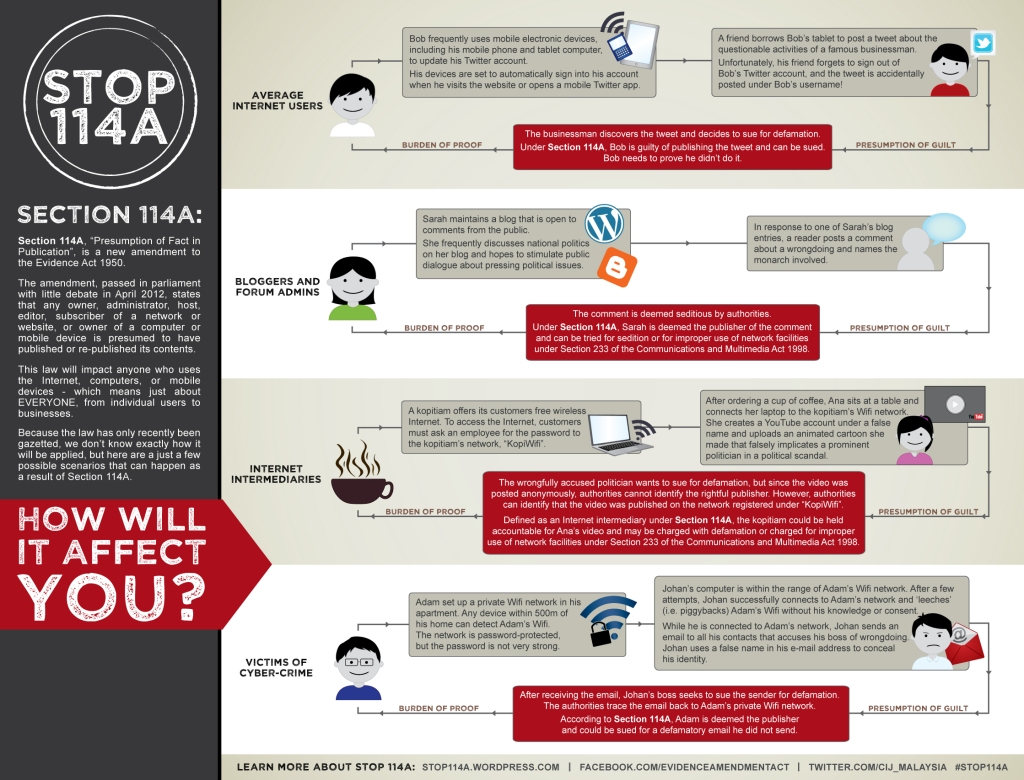 About Section 114A
About Section 114A
Source: STOP 114A site
What is Section 114A?
Section 114A is the second of two amendments made to Malaysia’s Evidence Act 1950.
Law Minister Nazri Aziz tabled the second amendment, formally known
as Evidence (Amendment) (No2) Act 2012, in Dewan Rakyat on 18 April.
James Dawos Mamit supported the motion, and Section 114A was passed
after the second and third reading. On 9 May, Dewan Negara passed the
amendment.
The amendment was gazetted on 31 July 2012. This means the law is now operational.
What is the purpose of Section 114A?
Section 114A deals with allegedly illicit or harmful content on the
Internet. In short, the amendment enables law enforcement officials to
swiftly hold someone accountable for publishing seditious, defamatory,
or libelous content online.
How does Section 114A affect you?
Titled “Presumption of Fact in Publication”, Section 114A holds the following people accountable for publishing content online:
(1) those who own, administrate, or edit websites open to public contributors, such as online forums or blogs;
(2) those who provide webhosting services or Internet access; and
(3) those own the computer or mobile device used to publish content online.
In other words, if allegedly defamatory content is traced back to
your username, electronic device, and/or WiFi network, Section 114A
presumes you are guilty of publishing illicit content on the Internet.
But what if you were the victim of identity theft and a hacker
wrongfully used your Twitter or Facebook account to post defamatory
content?
Under Section 114A, you are still considered guilty until proven innocent.
Section 114A is problematic for a number of reasons:
i) It disproportionately burdens average Internet users who are
wrongfully accused of publishing seditious or defamatory content.
ii) It makes Internet intermediaries–parties that provide online
community forums, blogging and hosting services–liable for content that
is published through their services.
iii) It allows hackers and cyber criminals to be free by making the
person whose account/computer is hacked liable for any content/data
which might have changed.
iv) It is a bad law passed in haste and does not take into account public interest and participation.
To get more details on how Section 114A could affect you, check out the infographic below:
How will Section 114A affect the freedom of expression?Section 114A threatens the right to freedom of expression. Internet users may resort to self-censorship to avoid false accusations made under Section 114A. Bloggers, for example, may excessively censor comments made by their readers. As a result, Section 114A inadvertently stifles public discussion about pertinent political or social issues and protects public authorities, such as the State, from public scrutiny.
Visit our Resources page to get a more detailed look at the text and implications of Section 114A.
………………………………………………………………………………………………………………………………………………………………………………………
关于114A条文
ABOUT SECTION 114A
114A条文是什么?What is Section 114A?
114A条文是《1950马来西亚证据法令》两项修正条文中的第二项。首相署部长纳兹里阿兹于4月18日向国会下议院提呈《2012年证据法令修正 法案》进行一读,并获得马来西亚旅游部副部长詹姆士道达沃斯支持。第114A条文顺利通过二读和三读,并于5月9日于国会上议院通过。
114A条文的目的是什么?
What is the purpose of Section 114A?
第114A条文针对涉嫌在互联网上发布非法和有害内容的行为。简言之,此修正法案让司法执行人员能够迅速地逮捕涉嫌在互联网发布煽动性、诽谤性或污蔑性内容的人士。
114A条文作了哪些不当的假设?
What does Section 114A presume?
在“假设性的事实”下,114A条文将在互联网上发布信息的责任归咎于下列人士:
(一) 拥有、管理、或编辑对公众开放言论空间的网页,如各类论坛或部落格的相关人士;
(二) 提供网络伺服器或上网服务的相关人士;及
(三) 用以发布相关内容的电脑或仪器的持有人。
换句话说,任何涉嫌诽谤的内容如果来自你的用户名(username)、你所拥有的电子仪器、及/或无线网络(WIFI),114A条文将预先假定你犯上在互联网上发布非法内容的罪名。
若你的身份被盗用或骇客非法使用你推特或面子书帐号发布具诽谤性内容,你将面对什么后果呢?
在第114A条文下,你将被认定有罪,除非你能证明自己是清白的。
114A条文有哪些不妥之处?
What is wrong with Section 114A?
第114A条文之所以构成问题是基于下列种种原因:
(一) 它把错误的将大部分(在互联网)发布煽动性或诽谤性内容的责任放在普通网民身上。
(二) 它让提供或管理网上论坛、部落格和伺服器的中介单位,必须为所有(在其所提供的服务范围内)刊载的内容负起法律责任。
(三) 它将互联网罪行的责任转嫁到受害者身上,世道入侵民众互联网户口或电脑并修改其内容及数据资料的骇客或网络罪犯得以免于承担(法律)责任。
(四) 它是仓促通过及不考虑公众利益及公众参与的一项糟糕的法律。
第114A法令如何影响言论自由?
How will Section 114A affect the freedom of expression?
第114A条文威胁了言论自由的权利。网民需常自我审查以避免在此条文下被错误提控。比方说,部落客需大量审查读者的留言。因此,第114A条文间接钳制了大众针对政治或社会课题的言论自由,并保护了政府当局以免于公众的监控。






No comments:
Post a Comment